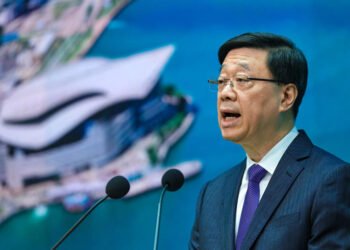Qatar called on Tuesday, December 24, 2024, for the quick removal of sanctions on Syria following the ousting of Bashar al-Assad by opposition forces.
Foreign ministry spokesperson, Majed al-Ansari told a regular briefing, “We call for intensified efforts to expedite the lifting of international sanctions on Syria.”
Al-Ansari asserted that Qatar’s position is “clear,” adding that it’s necessary to lift the sanctions quickly, “given that what led to these sanctions is no longer there and that what led to these sanctions were the crimes of the former regime.”
Qatar’s call came a day after a high-level delegation visited Damascus.
The Qatari Ministry of Foreign Affairs described the visit as “a reaffirmation of the strong fraternal relations between Qatar and Syria.”
It further emphasized Qatar’s ongoing commitment to supporting the Syrian people and safeguarding Syria’s sovereignty and independence.
The Qatari embassy in Damascus reopened on Sunday, December 22, 2024, ending a 13-year rift between the two countries.
Doha was one of the main backers of the armed rebellion that erupted after al-Assad’s government crushed a peaceful uprising in 2011.
Qatar did not renew ties with Syria despite its return to the Arab diplomatic fold last year.
The international community has not rushed to lift sanctions on Syria, waiting to see how the new authorities exercise their power.
Turkey has also made a similar call for sanctions on Syria to be lifted.
Turkish Foreign Minister, Hakan Fidan said on a visit to Damascus that the sanctions imposed on the previous regime need to be lifted as soon as possible.
He added that the international community needs to mobilize to help Syria get back on its feet and for the displaced people to return.
Syria’s De Facto Leader Reaches Agreement With Rebel Factions To Merge As One Force Under Defence Ministry
In other developments, a statement from the new Syrian general administration disclosed that Syria’s de facto leader, Ahmed al-Sharaa, reached an agreement on Tuesday with former rebel faction leaders to dissolve all groups and consolidate them under the defence ministry.
According to the statement, a meeting between al-Sharaa and the heads of the groups “ended in an agreement on the dissolution of all the groups and their integration under the supervision of the ministry of defence.”
However, the Kurdish-led and United States-backed Syrian Democratic Forces (SDF) group in northeastern Syria is not part of the deal just announced.
Prime Minister Mohammed al-Bashir had said last week that the ministry would be restructured using former rebel factions and officers who defected from Bashar al-Assad’s army.
Sharaa will face the daunting task of trying to avoid clashes between the myriad groups.
Syrian opposition fighters seized control of Damascus on December 8, 2024, forcing al-Assad to flee after more than 13 years of war, ending his family’s decades-long rule.
Forces under the command of al-Sharaa have installed a three-month caretaker government.
Following a sweeping offensive over two weeks ago that catapulted Hayat Tahrir al-Sham (HTS) into power in Damascus, the country’s new rulers appointed Murhaf Abu Qasra, a leading figure in the rebellion that toppled al-Assad, as Defence Minister in the interim government.
Al-Sharaa had previously promised that all weapons in the country, including those held by Kurdish-led forces, would come under state control.
He has sought to reassure Western officials visiting him that HTS, a former al-Qaeda affiliate, will neither seek revenge against the former regime nor repress any religious minority.
He said that his primary focus is on reconstruction and achieving economic development and that he is not interested in engaging in any new conflicts.
READ ALSO: Surging Coffee Prices Push Traders to Explore Alternative Hedging Strategies























